When peak tourism season hits, every hotel—whether a boutique inn, a luxury resort, or a business-friendly establishment—faces a dramatic surge in guest volume. As people flood to popular destinations, hotel operations can quickly shift from smooth and manageable to chaotic and overwhelmed. This is exactly where hotel staffing solutions step in as lifesavers. They fill critical labor gaps, enhance service quality, and ensure hotels maintain the high standards guests expect, even during the busiest times of the year. And let’s be honest—nothing destroys a traveler’s experience faster than long check-in lines, delayed room service, or rooms not being ready on time. That’s why staffing support isn’t just helpful—it’s essential.
Hotels often struggle during peak seasons because their full-time workforce simply wasn’t built to handle such intense bursts of activity. The sudden spike in guests can stretch staff to the point of burnout, compromise service quality, and ultimately damage guest satisfaction levels. With so many operations happening simultaneously—front desk tasks, housekeeping, food and beverage service, guest requests, and event management—the pressure becomes overwhelming without proper reinforcement. Hotel staffing solutions solve this by providing highly trained, readily available workers who can step in to support these functions immediately.
Another major benefit is flexibility. Seasonal staffing allows hotels to adapt quickly to fluctuating demand. Instead of hiring full-time employees they may not need year-round, hotels can scale their workforce up or down depending on occupancy levels. This is cost-effective while still ensuring excellent guest service. And the best part? These staffing professionals often come with specialized skills that hotels may struggle to recruit during busy times, such as culinary staff, bar attendants, concierge assistants, and event coordinators.
Ultimately, hotel staffing solutions keep operations running smoothly, boost guest satisfaction, support full-time employees, and protect the hotel’s reputation during the most critical times of the year. Without them, even the most well-managed hotel can struggle to keep up with demand. In the sections below, we’ll break down exactly what problems these staffing solutions solve and how they transform peak season from stressful to successful.
Understanding Peak Tourism Season in the Hospitality Industry
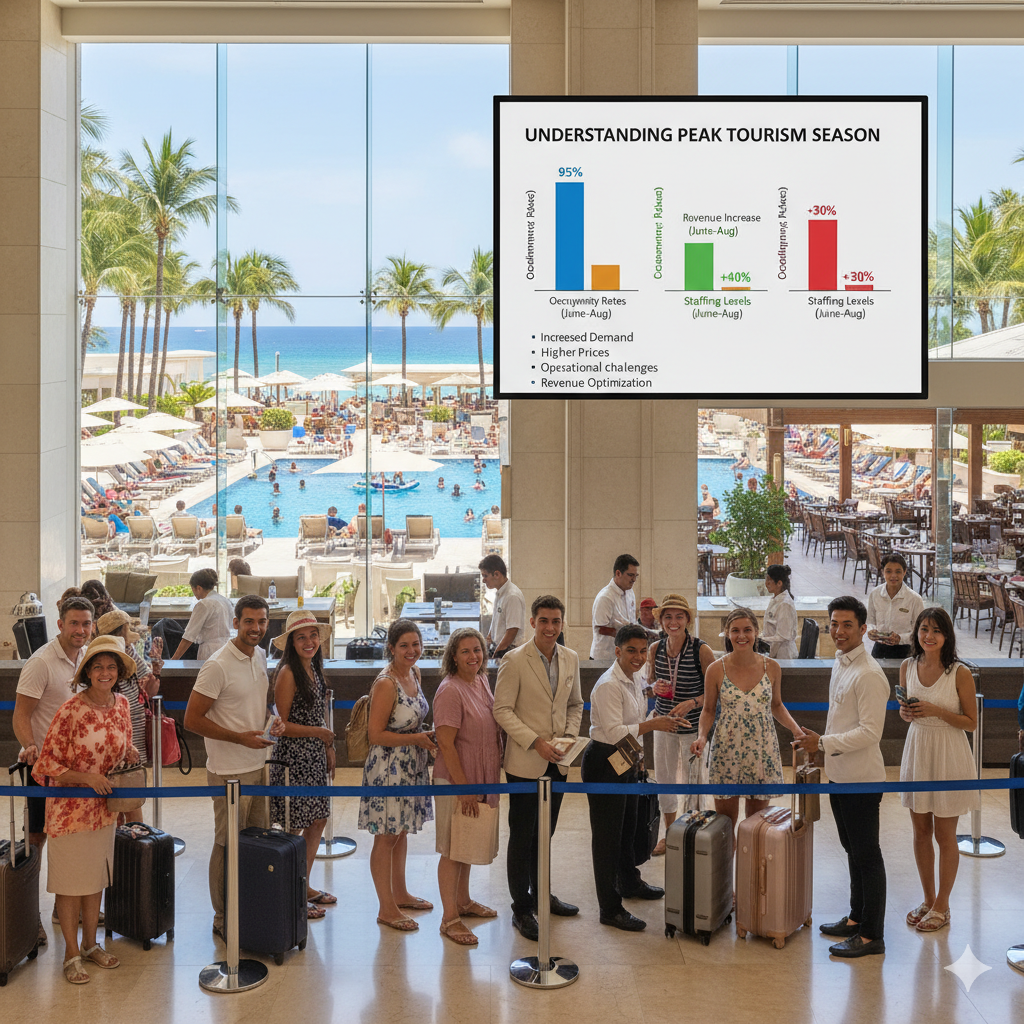
Peak tourism season is a thrilling yet challenging time for hotels. During these busy months, everything intensifies—guest arrivals skyrocket, room turnover speeds up, dining areas stay packed, and guest expectations climb even higher. Whether it’s summer vacation months, holiday travel waves, or big local events, hotels experience a massive influx of visitors that puts extra pressure on every department. And let’s face it, when more guests arrive at once, even the smallest operational gaps can snowball into bigger issues. Suddenly, front desk agents are juggling multiple check-ins, housekeeping is scrambling to prepare rooms faster than usual, and dining staff struggle to keep up with increased service demands. This is when peak season truly separates efficient hotels from overwhelmed ones.
One major challenge is unpredictability. Even with careful forecasting, hotels can’t always predict exactly how busy things will get. A sudden travel trend, a viral destination on social media, or an unexpected event can send guest numbers soaring overnight. Hotels often don’t have the luxury of time to recruit, interview, hire, and train new staff during such moments. And the result? Overworked employees, long lines, delayed services, and frustrated guests who may leave negative reviews that damage the hotel’s reputation. The hospitality industry depends heavily on guest experience, and peak season makes maintaining that experience much harder.
Another problem hotels face is maintaining consistency. When operations accelerate, it becomes difficult for small teams to provide the same level of attention and care they offer during quieter months. Tasks that are normally simple—like answering guest questions, managing housekeeping requests, or delivering meals—become complicated when hundreds of guests are expecting fast, friendly service all at once. Even experienced staff can get overwhelmed, leading to mistakes or burnout. This is why hotels need reliable staffing support that seamlessly integrates with their existing team.
Understanding the full scope of peak tourism challenges is essential because it sets the stage for how hotel staffing solutions can eliminate these pressure points. By recognizing the difficulty of handling seasonal surges, hotels can better appreciate the value of flexible, trained, and ready-to-work seasonal staff who help restore balance and maintain high performance throughout the busiest months.
Why Hotel Staffing Solutions Matter During Tourism Surges
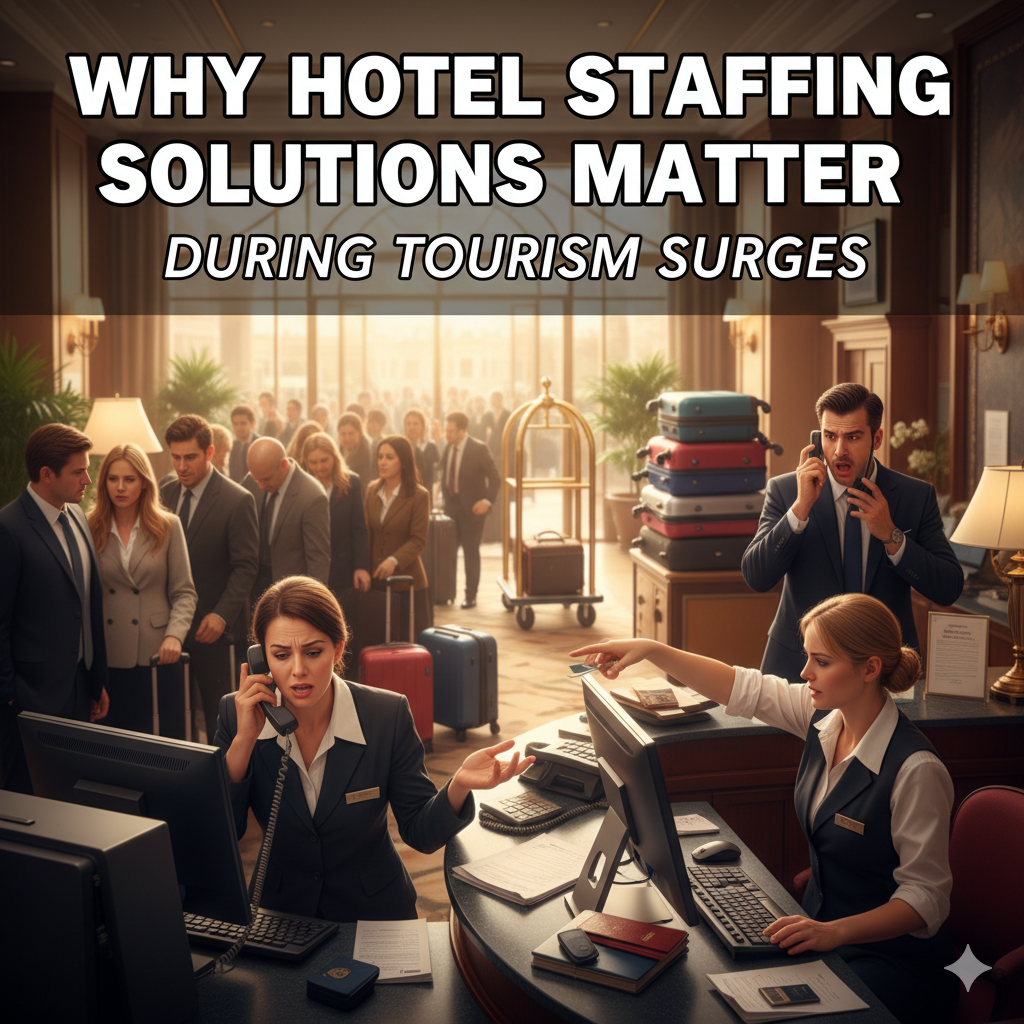
When tourism surges hit, the hotel environment changes overnight. What was once a steady flow of guests now becomes a rapid, nonstop stream of arrivals, requests, and expectations. This is exactly why hotel staffing solutions matter so much during peak tourism season. They give hotels the power to stay in control even when guest numbers are at their highest. The truth is, hotels are built to offer comfort and seamless service—but without enough hands on deck, even the best-run property can fall behind. Staffing solutions provide that missing balance by delivering trained, reliable, and flexible workers who can jump into operations immediately.
One of the biggest advantages of seasonal staffing is improved operational efficiency. Every hotel runs on a rhythm, and during peak season, that rhythm speeds up dramatically. Front desk staff must check in guests faster, housekeeping must turn over rooms more frequently, and the food and beverage teams must handle far more orders without sacrificing quality. When a hotel doesn’t have enough personnel, this rhythm collapses. Tasks pile up, wait times increase, and guests begin feeling the strain. Seasonal staffing brings reinforcement exactly where it’s needed, helping every department maintain performance even at full capacity.
Another major benefit is elevated guest experience. Travelers arriving during peak season often expect the same level of attention and service they would receive during quieter months. They don’t care that the hotel is busier—they simply want a pleasant stay. With additional staffing, hotels can continue delivering personalized, fast, and friendly service. Instead of long waits at reception or slow room service, guests enjoy a smooth, efficient experience that makes their stay memorable for the right reasons.
Hotel staffing solutions also support long-term reputation management. Busy seasons often lead to rushed interactions and performance slips that can later appear as negative online reviews. A few poor ratings can impact future bookings, especially since travelers rely heavily on reviews before choosing where to stay. With the right number of skilled staff on site, hotels maintain consistency, avoid service breakdowns, and protect their reputation during their most important earning periods.
In essence, staffing solutions aren’t just a quick fix—they are a strategic tool that strengthens hotel operations, enhances guest satisfaction, and ensures the hotel’s overall success during tourism surges.
Managing Sudden Increases in Guest Volume With Staffing Solutions
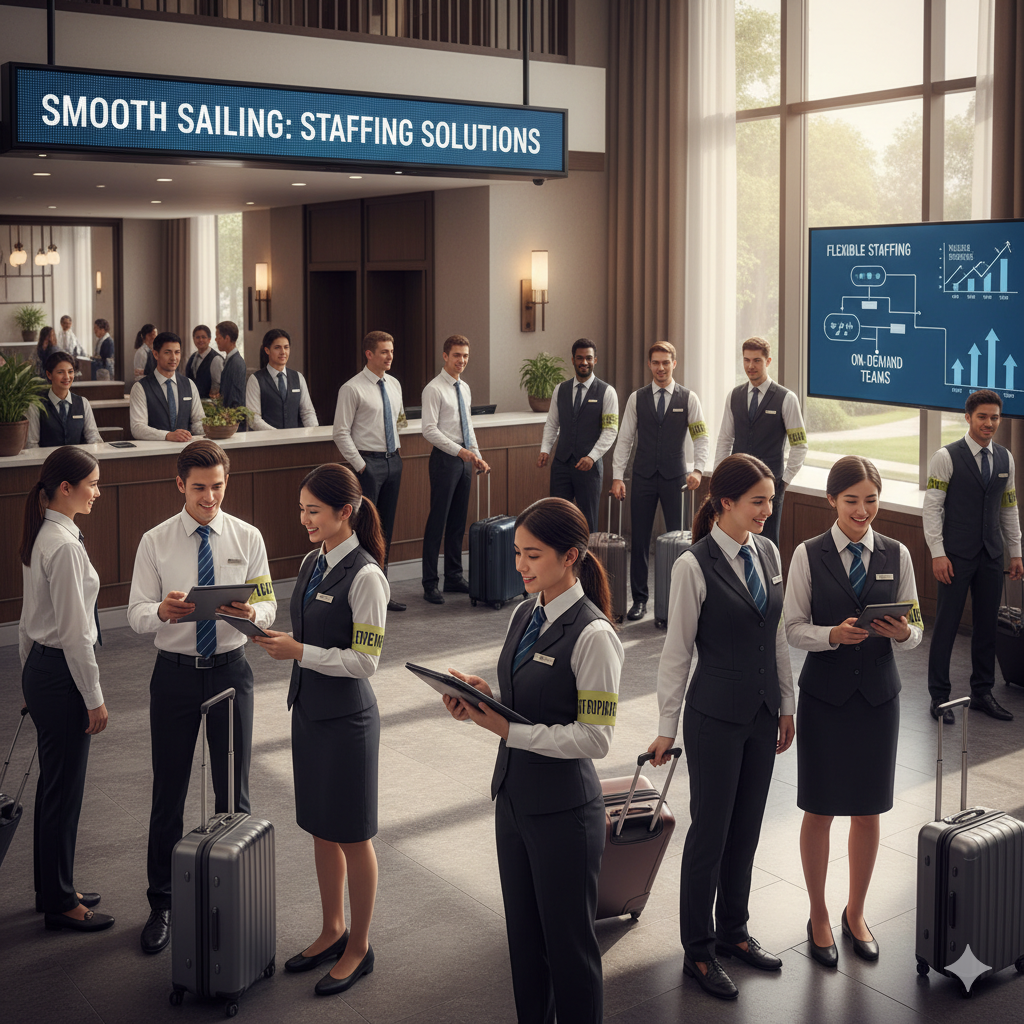
One of the biggest challenges hotels face during peak tourism season is managing the sudden and overwhelming increase in guest volume. When hundreds or even thousands of guests arrive within the same timeframe, it puts immense strain on the hotel’s core operations. Without proper staffing support, even the most organized hotel teams can find themselves buried under a growing list of tasks. This is where hotel staffing solutions provide a critical advantage—they help hotels stay agile, responsive, and efficient, even when guest numbers surge far beyond normal.
Front desk operations are usually the first to feel the pressure. Long lines, delayed check-ins, overwhelmed staff, and frustrated guests can instantly create a negative first impression. But with additional front desk agents brought in through staffing solutions, hotels can significantly reduce wait times and improve the flow of arrivals. These trained professionals step in to handle guest inquiries, process check-ins more quickly, and manage the steady stream of questions that often come with busy seasons. This creates a smoother, more pleasant experience for everyone walking through the door.
Housekeeping also faces extreme pressure during peak demand. When occupancy rises, so does the number of rooms that must be cleaned, refreshed, and prepared for new arrivals. Without enough housekeepers, rooms take longer to turn over, leading to late check-ins and unhappy guests waiting for their accommodations to be ready. Hotel staffing solutions offer an immediate fix by providing extra housekeeping staff who work alongside the existing team to handle the increased workload efficiently. Faster turnover means guests receive their rooms on time, service standards remain high, and the hotel avoids operational bottlenecks.
Additionally, guest requests multiply during peak season. From extra towels and room service orders to maintenance calls and concierge assistance, the volume of guest needs grows rapidly. Supplemental staff help distribute this workload so that no department becomes overwhelmed. This balanced support prevents service delays and ensures guests receive the quick, attentive care they expect.
Ultimately, hotel staffing solutions transform what could be a stressful, chaotic period into a well-managed, structured season. They help hotels maintain seamless operations, keep guests satisfied, and protect the hotel’s reputation even during the busiest times of the year.
Solving Workforce Shortages in Hotels During Peak Season
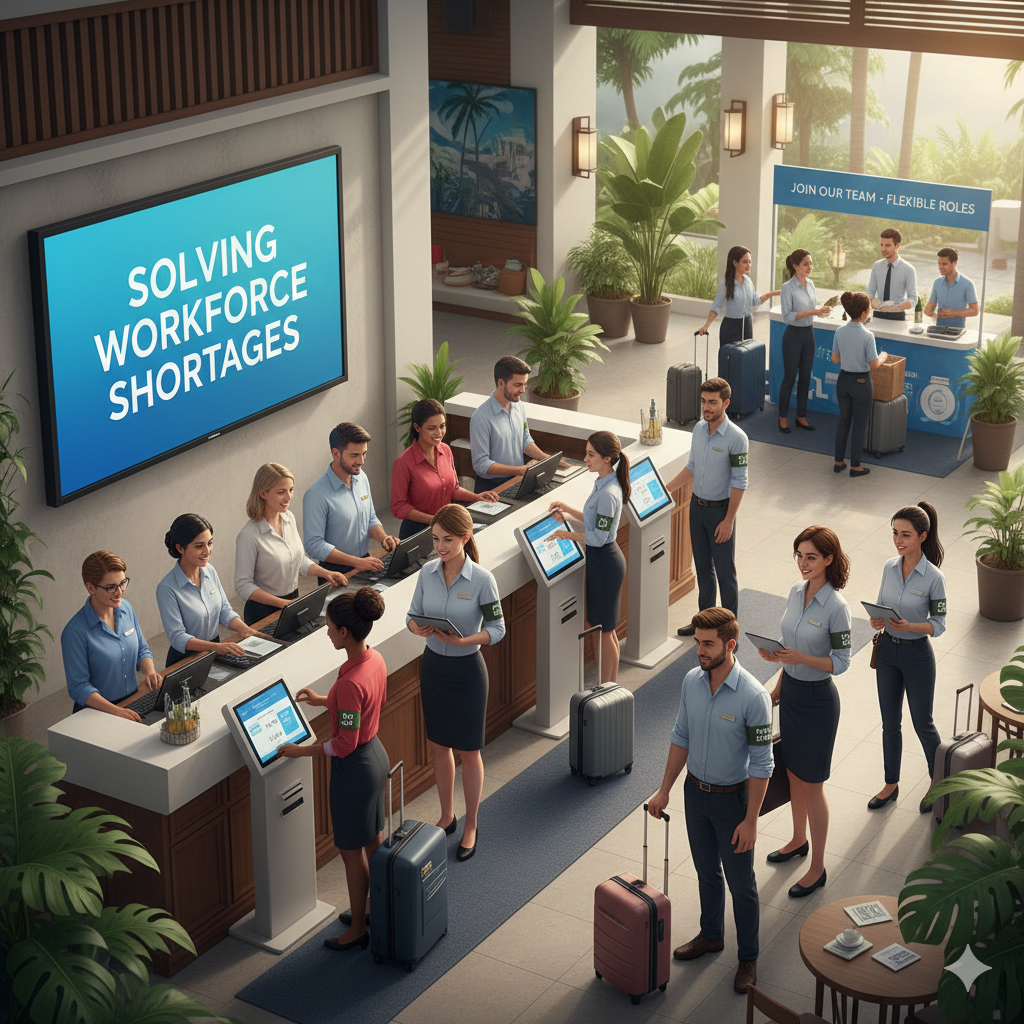
Workforce shortages are one of the most persistent issues hotels face, especially during peak tourism seasons. When guest numbers spike, hotels simply cannot operate smoothly with the same number of permanent employees they rely on during quieter months. Yet hiring full-time staff for temporary demand is neither cost-effective nor practical. This is where hotel staffing solutions become indispensable. They bridge the gap between soaring guest demand and limited in-house personnel by supplying trained workers exactly when hotels need them the most.
Every department within a hotel feels the strain of workforce shortages. Housekeeping is often understaffed, resulting in slower room turnover and delayed check-ins. Front desk teams struggle to manage the flow of guests arriving and departing throughout the day. Restaurant and bar staff become overwhelmed with increased dining traffic, and room service falls behind on orders. Even maintenance teams face added pressure as higher occupancy means more wear and tear on hotel facilities. Trying to stretch a small staff to cover all of these responsibilities inevitably leads to burnout, errors, inconsistent service, and dissatisfied guests. Hotel staffing solutions prevent these issues by ensuring every department has enough hands to keep operations running efficiently.
One major advantage of seasonal staffing is the ability to hire workers with specialized skills. A hotel may not need an experienced banquet server, barista, or event coordinator year-round—but during peak season, these roles become essential. Staffing solutions allow hotels to bring in multi-skilled workers who immediately enhance service quality without requiring extensive training. This adaptability helps hotels remain competitive during busy periods, offering guests a polished, professional experience despite the temporary surge in business.
Another key benefit is speed. Recruiting new employees from scratch takes weeks or months, but seasonal staffing agencies can provide qualified workers almost instantly. This quick access is especially helpful when guest demand increases unexpectedly or when current staff call out due to illness or fatigue. Instead of scrambling to cover shifts, hotels can rely on a steady pipeline of flexible workers ready to step in.
By solving workforce shortages quickly and effectively, hotel staffing solutions protect a hotel’s reputation, reduce pressure on full-time employees, and maintain service excellence even during its busiest and most profitable seasons.
Reducing Employee Overload and Burnout Through Staffing Solutions

Employee overload and burnout are some of the most damaging problems hotels face during peak tourism season. When guest numbers skyrocket, the workload on existing staff increases dramatically—longer shifts, fewer breaks, constant guest requests, and the pressure to maintain high service standards. While many hotel employees are skilled at working in fast-paced environments, even the most dedicated team members have limits. This is why hotel staffing solutions play such a crucial role during busy seasons—they help prevent burnout, protect employee well-being, and maintain the overall quality of service.
During peak season, full-time hotel staff often find themselves juggling multiple roles. A front desk agent might manage check-ins, answer phones, coordinate with housekeeping, and assist guests with local recommendations—all at once. Housekeepers may be required to clean more rooms daily, often under tighter time constraints. Food and beverage staff might manage more tables, fulfill room service orders, and support banquets or events simultaneously. Without additional help, this constant multitasking becomes exhausting and unsustainable. Seasonal staffing provides the reinforcement needed to distribute responsibilities more evenly, ensuring that no team member is pushed beyond their physical and mental capacity.
Reducing overload is not just about easing stress—it directly impacts performance. Overworked employees are more likely to make mistakes, forget details, or deliver rushed service. This can quickly lead to guest dissatisfaction, negative reviews, and even complaints. On the other hand, when staffing levels are sufficient, employees can focus on delivering thoughtful, attentive service. They perform their roles with more confidence, accuracy, and patience. Even small improvements in morale can transform the guest experience.
Burnout also has long-term consequences for hotels. When employees feel consistently overwhelmed, turnover increases. Hiring and training new workers becomes costly and time-consuming, especially when done repeatedly. Seasonal staffing solutions help retain permanent staff by supporting them during the most demanding months. This stability not only protects the hotel’s investment in its workforce but also contributes to a more positive workplace culture.
With staff shortages eliminated and workloads balanced, hotels create an environment where employees feel energized rather than exhausted. In turn, this leads to happier guests and better overall performance throughout the peak season.
Improving Housekeeping Efficiency With Hotel Staffing Solutions
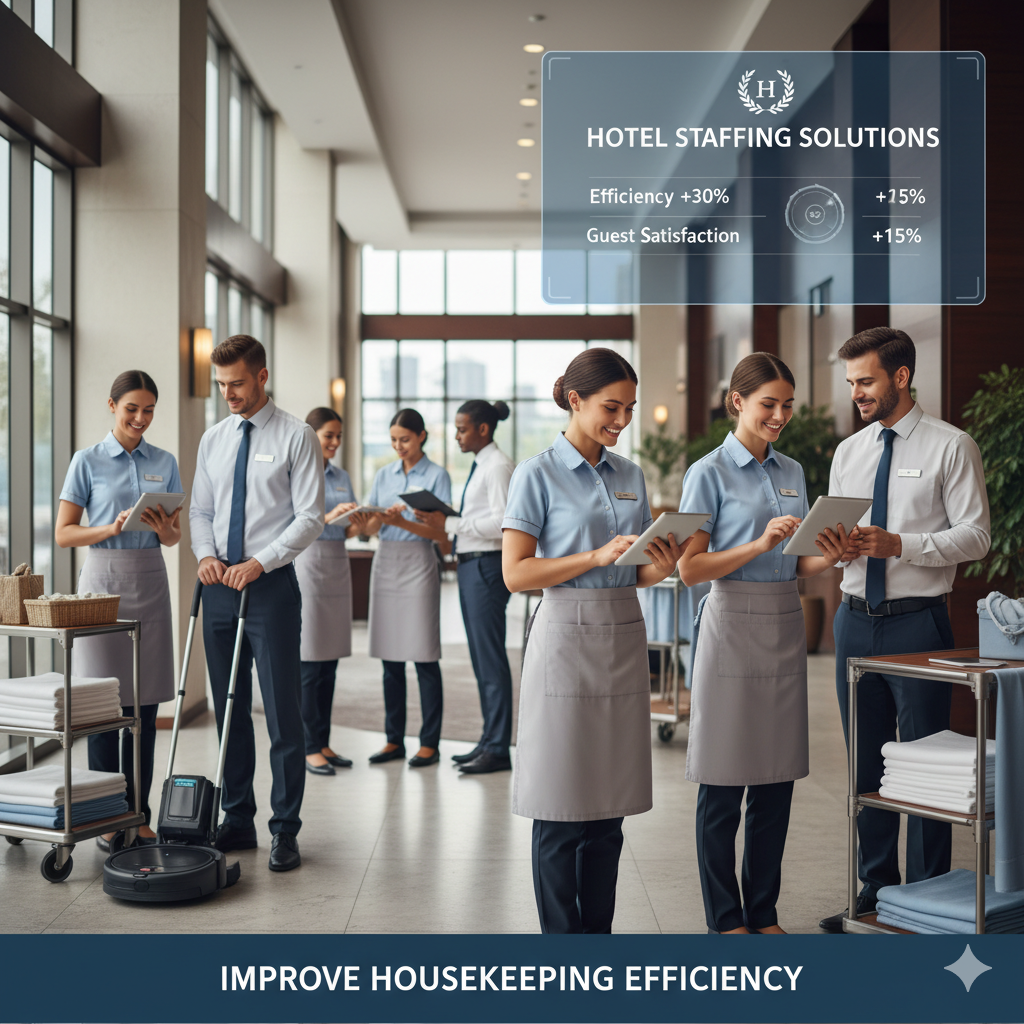
Housekeeping is the backbone of hotel operations, especially during peak tourism season. A guest’s first impression of their room—cleanliness, freshness, and readiness—plays a massive role in their overall satisfaction. But when guest numbers surge, the housekeeping department often becomes overwhelmed. More check-ins mean more room turnovers, more linens to wash, more amenities to restock, and more inspections to complete. Without additional support, delays become unavoidable. This is why hotel staffing solutions are essential for maintaining housekeeping efficiency during the busiest months.
During peak season, turnover time becomes a race against the clock. Guests checking out late and others arriving early put extreme pressure on the housekeeping team to prepare rooms quickly without compromising quality. An understaffed housekeeping department may take longer to complete each room or feel forced to rush, which can result in overlooked details—dirty corners, missed items, or improperly prepared amenities. These small issues quickly escalate into negative reviews, complaints, or requests for room changes. Seasonal staffing ensures housekeeping teams have enough people to handle increased workloads with precision and consistency.
Another benefit of additional housekeeping staff is improved workflow organization. Large hotels often operate multiple floors with dozens of rooms per hallway. When extra team members join the shift, cleaning routes can be optimized more effectively. Instead of one housekeeper being assigned too many rooms, tasks can be distributed evenly, helping everyone work at a manageable pace. Supplemental staff also allow hotels to introduce specialized roles such as linen runners, turndown attendants, public-area cleaners, or deep-cleaning specialists. These roles help maintain high hygiene standards throughout the hotel, even when room demand is at its peak.
Quality control also improves with seasonal staffing. Supervisors have more time to inspect rooms and ensure everything meets the hotel’s standards before guests arrive. Instead of rushing through inspections, they can check every detail thoroughly. This leads to cleaner rooms, better guest satisfaction, and fewer service recovery issues later.
Overall, boosting housekeeping efficiency through staffing solutions helps hotels avoid delays, maintain cleanliness, and deliver an exceptional guest experience. Guests enjoy spotless, ready-on-time rooms, while staff benefit from manageable workloads and a less stressful environment.
Enhancing Front Desk Operations With Additional Staff

Front desk operations are the heartbeat of any hotel. This is where every guest’s experience begins and ends, making it one of the most important departments to keep running smoothly—especially during peak tourism season. When guest volume rises sharply, front desk teams are often the first to feel the pressure. Long lines, impatient guests, constant phone calls, check-in and check-out traffic, special requests, and frequent coordination with other hotel departments all collide at once. Without enough help, even highly skilled front desk staff can become overwhelmed. This is where hotel staffing solutions make a big impact.
One of the most immediate improvements additional staffing provides is reduced wait times. Nobody likes standing in line after a long flight or early-morning road trip. But during peak season, lines can easily form if there aren’t enough front desk agents to handle the influx of arrivals. Supplemental staff ensure multiple stations can stay open, allowing guests to move through the check-in process quickly and efficiently. Fast check-ins create a strong first impression, setting the tone for the rest of the guest’s stay.
Beyond handling arrivals, front desk agents also manage heavy phone traffic during busy periods. Guests call for everything from restaurant recommendations to extra amenities, wake-up calls, service requests, and reservation changes. With additional workers, calls are answered promptly, reducing frustration for guests who need assistance. This also allows in-house staff to stay focused on face-to-face interactions, ensuring every guest receives friendly, attentive service.
Another major advantage is smoother communication between departments. The front desk constantly coordinates with housekeeping to confirm room readiness, with maintenance to resolve issues, and with food and beverage teams for guest requests. During high occupancy, these communications multiply. Extra staffing helps maintain clear, organized information flow, preventing delays and errors that could negatively impact guests.
Additional front desk staff also enhance guest engagement. With more support, agents have time to offer personalized attention—sharing local tips, answering questions, assisting with transportation, or helping plan activities. These small gestures significantly elevate the guest experience and contribute to positive reviews.
Ultimately, staffing solutions empower the front desk team to operate at full efficiency, handle high demand with confidence, and provide the warm hospitality guests expect during their stay.
Streamlining Food and Beverage Operations During Peak Season
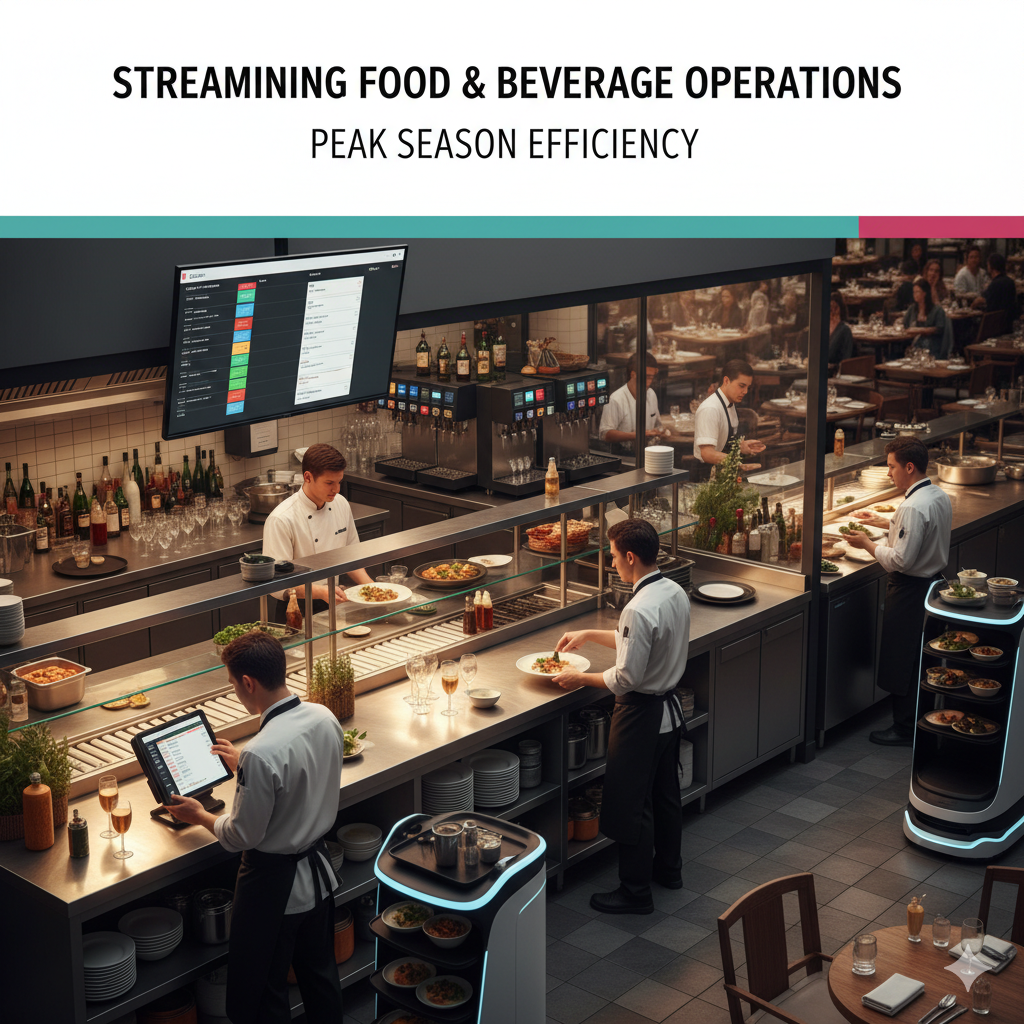
Food and beverage operations are among the busiest and most dynamic departments in any hotel, and during peak tourism season, they experience a dramatic surge in demand. Restaurants, lounges, bars, coffee shops, buffets, and room service all work at maximum capacity as guests look for meals, snacks, and specialty dining experiences. Without the right level of staffing support, food and beverage operations can easily become overwhelmed, leading to delays, inconsistent service, and poor guest satisfaction. This is why hotel staffing solutions play a vital role in keeping these areas operating smoothly during high-demand periods.
One of the most significant challenges hotels face in peak season is maintaining fast service in dining areas. Guests often expect quick seating, prompt order-taking, and minimal waiting time for their meals, especially when they are on vacation or have limited time before an event or excursion. Seasonal staffing helps by providing extra servers, hosts, bussers, and food runners who can manage larger crowds more effectively. With enough people on the floor, tables turn over faster, service becomes smoother, and staff can give guests the attentive experience they expect.
The kitchen, too, feels the strain during tourism surges. More guests mean more orders, and without additional support, kitchen staff can fall behind. Hotel staffing solutions allow hotels to bring in experienced cooks, prep workers, dishwashers, and kitchen assistants who keep operations running at full speed. With extra hands handling preparation and cleanup, chefs can focus on quality, consistency, and food presentation—critical factors that influence guest satisfaction.
Room service also becomes increasingly demanding during peak months. Guests who prefer in-room dining expect timely delivery and accurate orders. Additional staff play a critical role in ensuring the room service team stays organized and responsive, even when the volume of orders doubles or triples.
For hotels that host weddings, conferences, meetings, and large events, peak season can become even more challenging. Banquet staff are essential for setting up venues, managing service flow, and ensuring a smooth experience for attendees. Staffing solutions provide trained banquet servers, bartenders, event assistants, and coordinators who help hotels manage large events without stretching existing teams too thin.
With streamlined food and beverage operations supported by additional staffing, hotels avoid delays, maintain high service standards, and deliver memorable dining experiences that keep guests coming back.
Optimizing Hotel Event Management Through Staffing Solutions
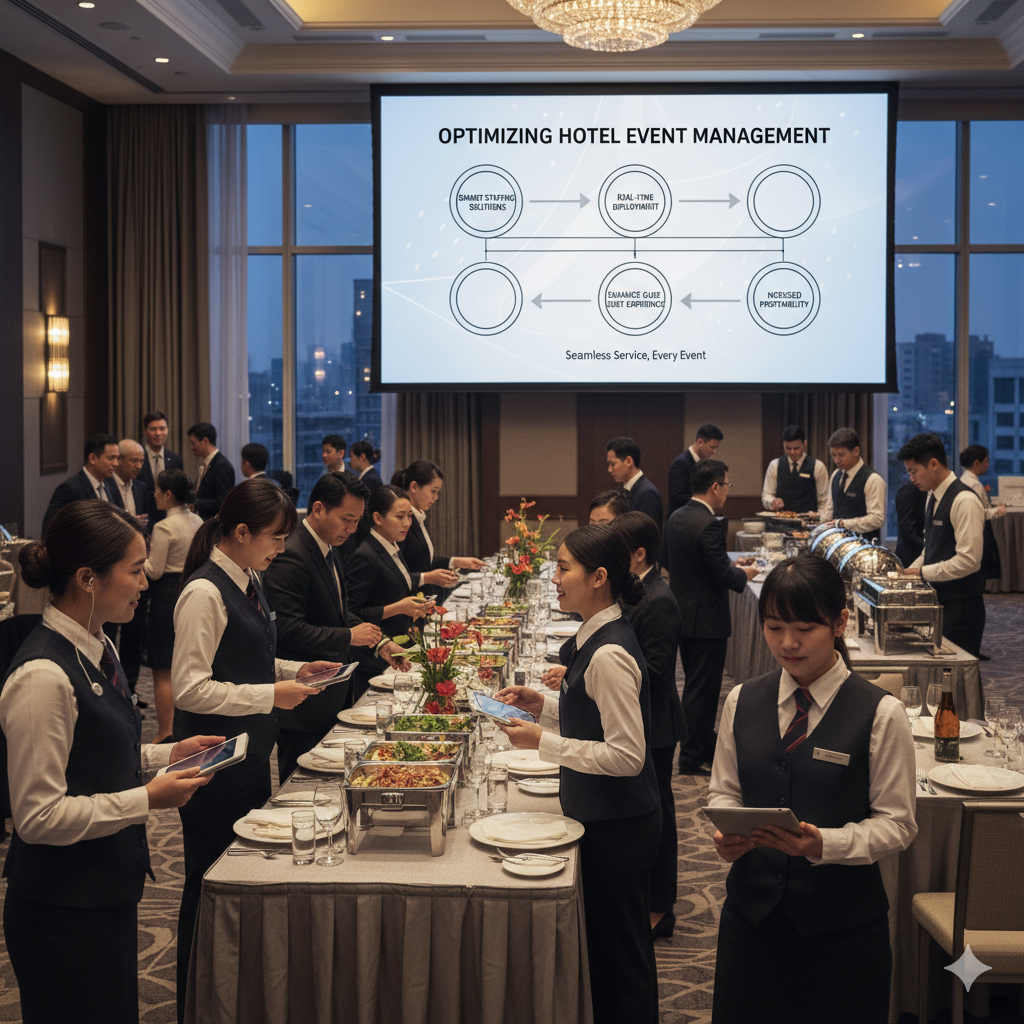
Event management is one of the most complex and high-pressure areas in the hospitality industry, especially during peak tourism season. Hotels frequently host weddings, conferences, business meetings, family reunions, festivals, banquets, and special celebrations—all while accommodating a large number of regular guests. This dual pressure can overwhelm hotel teams if they don’t have adequate support. That’s why hotel staffing solutions are crucial for optimizing event management during busy periods.
During peak season, event schedules often run back-to-back. One ballroom may host a corporate conference in the morning, a wedding reception in the afternoon, and a birthday celebration in the evening. Each event requires extensive setup, service, teardown, and coordination. Without additional staff, even the best event teams can become overloaded, leading to delays, miscommunication, and reduced service quality. Temporary event staff help by providing the manpower needed to handle multiple events efficiently and professionally.
One of the biggest advantages is the availability of trained banquet servers and hospitality professionals who understand the fast-paced nature of large events. These workers are familiar with tasks such as table setting, buffet management, plate serving, beverage service, guest assistance, and clearing tables. Their expertise enables events to run smoothly from start to finish, leaving guests with a polished and seamless experience. Meanwhile, hotel staff can focus on high-level coordination rather than scrambling to manage every detail.
Event setup and teardown also require significant manpower. Setting up tables, staging, audio-visual equipment, decorations, and signage is time-consuming and physically demanding. Staffing solutions provide extra hands that accelerate these processes, ensuring each event space is ready on time. This allows hotels to book more events during peak season without risking scheduling conflicts or rushed preparations.
Additionally, large events often require specialized skills such as bartending, technical support, or guest registration management. Instead of training existing staff or borrowing employees from other departments—leaving those areas short-handed—hotels can bring in skilled temporary workers who know exactly what to do. This creates a professional, organized environment that enhances the event’s overall success.
By strengthening event management with reliable staffing solutions, hotels increase their capacity to host more events, boost revenue, maintain service quality, and avoid overwhelming their core staff.
Maintaining Guest Satisfaction With Staffing Solutions
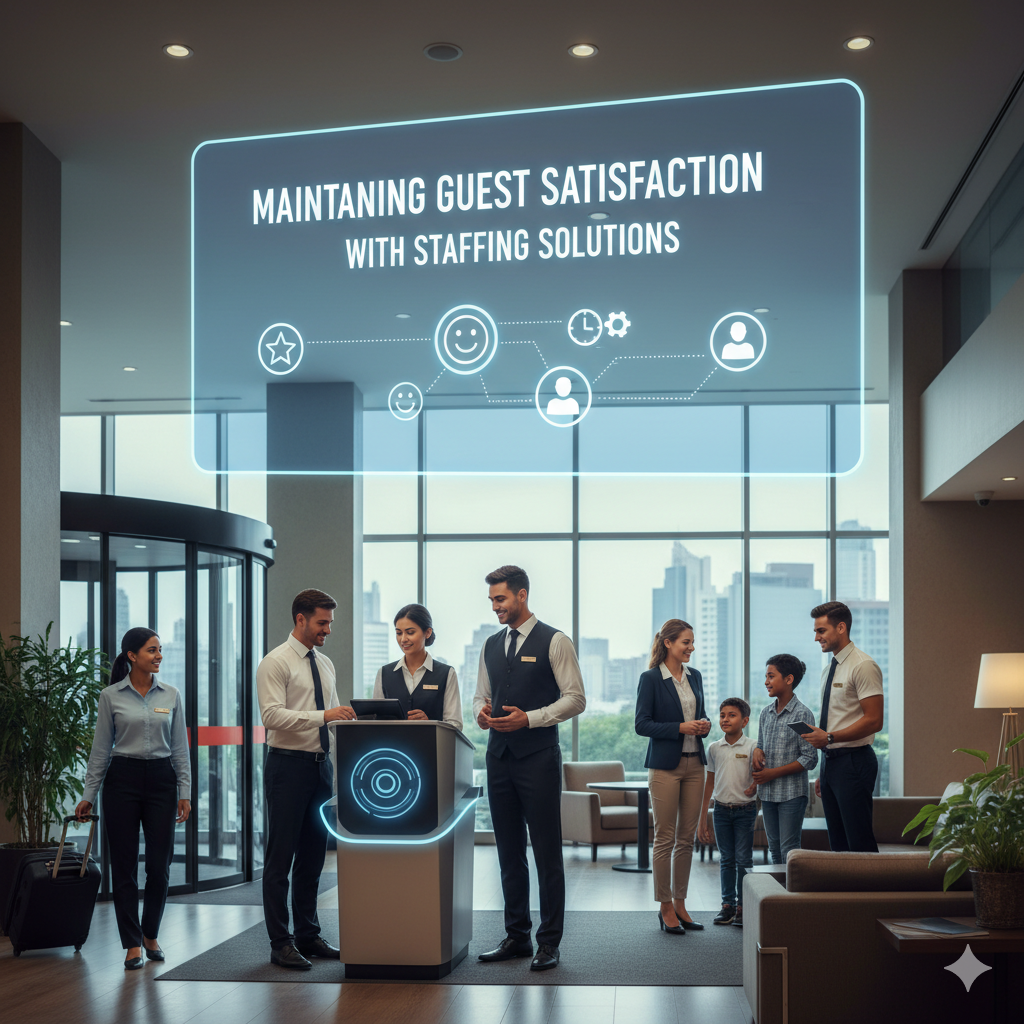
Guest satisfaction is the heartbeat of every successful hotel, and during peak tourism season, it becomes more important—and more challenging—than ever. With higher occupancy levels, more service requests, busier dining areas, and crowded public spaces, hotels must work twice as hard to deliver the same level of comfort and attention guests expect. Without proper staffing support, even small service delays can quickly turn into negative experiences. This is where hotel staffing solutions play a vital role in maintaining guest satisfaction and protecting the hotel’s reputation.
One of the biggest contributors to guest satisfaction is responsiveness. Guests want to feel heard and taken care of, whether they’re asking for extra towels, inquiring about local attractions, or making dining reservations. During peak season, these requests multiply rapidly. Without enough staff on duty, response times slow down, leading to frustration and disappointment. Seasonal staffing helps ensure every guest receives prompt, attentive service, even when the hotel is at full capacity. With more team members available to handle calls, answer questions, and assist with requests, guests feel valued and supported throughout their stay.
Cleanliness is another major factor affecting guest satisfaction. A spotless room, fresh linens, and sparkling bathrooms are non-negotiable expectations. During busy seasons, housekeeping teams may struggle to keep up with increased turnover, which can lead to rushed cleaning or overlooked details. Staffing solutions help maintain high cleanliness standards by providing extra housekeepers, inspectors, and public area cleaners. This ensures that rooms are ready on time and meet the quality guests expect, enhancing their overall impression of the hotel.
Food and beverage service also directly impacts guest satisfaction. Long wait times, slow service, or limited menu availability can quickly lead to complaints. With extra servers, hosts, bartenders, and kitchen staff, the dining experience becomes smoother and more enjoyable, leaving guests with positive memories instead of frustration.
Lastly, guest reviews are heavily influenced by customer service. A friendly smile, a helpful attitude, and efficient problem-solving all contribute to the way guests perceive their stay. When hotel staff are calm, supported, and not overwhelmed, they naturally deliver better service. Seasonal staffing ensures that employees have manageable workloads, allowing them to remain patient, welcoming, and attentive.
By supporting every department and reducing stress on core staff, hotel staffing solutions help maintain high guest satisfaction—even during the busiest travel seasons.
Cost Efficiency and Revenue Optimization Through Seasonal Staffing
During peak tourism season, hotels walk a fine line between maximizing profits and managing operational expenses. Hiring full-time staff for temporary spikes in demand is costly, inefficient, and unsustainable. This is exactly why seasonal hotel staffing solutions offer a smarter financial strategy. They not only help hotels stay within budget but also play a major role in increasing revenue, boosting occupancy, and improving overall profitability during the busiest months of the year.
The first and most obvious cost-saving benefit is avoiding unnecessary year-round salaries. Many hotels struggle with staffing fluctuations—lean too heavily on full-time employees and labor costs soar, rely too little on additional help and service quality drops. Seasonal staffing creates a flexible balance. Hotels can scale their workforce up when guest numbers rise and reduce staff when business returns to normal. This flexibility eliminates the financial burden of paying full-time wages, benefits, and long-term training for roles that are only needed during high-demand periods.
Another key benefit is the reduction of overtime expenses. When hotels are understaffed during peak season, employees often work overtime to cover shifts, resulting in significantly higher payroll costs. Overtime pay adds up quickly and can dramatically cut into profits. Seasonal staffing solutions prevent this issue by distributing workload evenly, reducing the need for overtime and helping hotels save thousands of dollars during peak months.
Beyond cost savings, seasonal staffing also drives revenue growth. Hotels that are adequately staffed can handle more bookings, provide faster service, and operate more efficiently—all of which translate to higher guest satisfaction and increased revenue opportunities. For example, quicker room turnover allows hotels to maximize occupancy, especially when guests arrive early or depart late. In dining areas, more servers mean more tables turned per shift, boosting food and beverage revenue. In event operations, having enough staff allows hotels to book multiple events in a single day without compromising quality.
Revenue is also protected through reputation management. Poor service during peak season can lead to negative reviews, reduced bookings, and long-term brand damage. By maintaining service quality through adequate staffing, hotels safeguard future revenue streams and build customer loyalty.
Overall, seasonal staffing is not just a cost-control measure—it’s a smart business investment. It helps hotels optimize resources, boost operational capacity, and maximize profitability during the most lucrative times of the year.
Specialized Skills and Roles Provided by Hotel Staffing Solutions

Hotels are complex environments with many moving parts, and during peak tourism season, they require far more than just basic staffing support. They need skilled professionals who can step into specialized roles and perform with confidence from day one. This is where hotel staffing solutions become especially valuable. These solutions provide access to a wide range of trained workers who bring unique expertise, helping hotels maintain exceptional service quality even during the busiest times of the year.
One of the biggest advantages of seasonal staffing is the ability to fill roles that require specific knowledge or technical skills. For example, hotels often need experienced bartenders who can handle high-volume service while crafting drinks quickly and accurately. Similarly, skilled kitchen staff—such as line cooks, prep cooks, and pantry chefs—are essential to keep food and beverage operations running smoothly. These roles cannot be filled casually; they require trained professionals who understand food safety, kitchen workflow, and timing under pressure. Seasonal staffing ensures hotels have access to this specialized talent when demand peaks.
Hotels also benefit from specialized front-of-house roles like concierge assistants, bell staff, and guest service attendants. These workers elevate the guest experience through personalized support, local knowledge, and a welcoming presence. During peak season, when travelers frequently need recommendations, transportation assistance, and itinerary planning, having extra concierge staff greatly enhances the hotel’s service offerings. Bell staff also play a key role during busy check-in and check-out periods, helping with luggage management and ensuring guests feel taken care of from the moment they arrive.
Banquet and event positions are another major area where specialized skills are needed. Banquet servers, event coordinators, audiovisual technicians, bartenders for private events, and setup crews all require training and experience. Event operations are often high-pressure environments where timing, organization, and professionalism matter. With staffing solutions, hotels can bring in teams who have worked in similar settings and can adapt quickly to different event formats and guest expectations.
Maintenance roles are equally important. Higher occupancy means more wear and tear on hotel facilities—broken fixtures, HVAC issues, plumbing needs, and room repairs. Skilled maintenance technicians from staffing solutions allow hotels to stay on top of repairs without overloading their in-house team.
By accessing specialized skills through seasonal staffing, hotels strengthen their departments, maintain consistent service excellence, and provide guests with a professional and enjoyable experience even at peak capacity.
Using Staffing Solutions to Enhance Operational Flexibility
Operational flexibility is one of the most powerful advantages a hotel can have during peak tourism season. With fluctuating guest numbers, sudden booking surges, and unpredictable staffing needs, hotels must be able to adapt quickly. This is where hotel staffing solutions become invaluable. They give hotels the ability to scale their workforce up or down effortlessly, ensuring smooth operations no matter how busy things get. Instead of stretching permanent employees too thin or scrambling to hire last-minute staff, hotels can rely on a flexible, ready-to-work pool of trained professionals.
During peak season, occupancy rates can change rapidly. A holiday weekend, festival, conference, or even a viral social media trend can dramatically increase demand without warning. Hotels that lack staffing flexibility struggle to keep up, leading to long wait times, room readiness delays, and overall service inconsistency. By leveraging staffing solutions, hotels can quickly bring in additional front desk agents, housekeepers, servers, or maintenance staff to meet rising demand. This rapid response capability keeps operations stable and helps the hotel maintain its service standards regardless of unexpected guest surges.
Flexibility also plays a major role in shift coverage. Peak season often leads to staff fatigue, increased sick days, and sudden call-outs. When full-time employees are overwhelmed, productivity drops and morale suffers. With access to seasonal or temporary staff, hotels can cover gaps in the schedule instantly—preventing departments from being short-handed and ensuring that employees do not burn out from excessive workloads. A well-balanced, well-supported team is more efficient, organized, and capable of delivering top-tier service.
Operational flexibility is equally important for special events and group bookings. Large weddings, corporate meetings, and social gatherings often require extra hands for setup, service, and teardown. Instead of pulling staff from other departments—leaving those areas short-staffed—hotels can bring in event-specific personnel who know how to manage banquets, conferences, and receptions with ease.
Additionally, staffing flexibility helps hotels maintain operational efficiency without committing to long-term labor costs. Seasonal staffing allows hotels to match their workforce precisely to business needs. When peak season ends, staff numbers can be reduced without layoffs, payroll strain, or complicated restructuring.
In short, staffing solutions give hotels the agility they need to thrive even when demand is unpredictable. They enable hotels to maintain high service standards, support their employees, and stay profitable all year long.
The Role of Technology in Modern Hotel Staffing Solutions

Technology has transformed nearly every aspect of the hospitality industry, and staffing is no exception. Today’s hotel staffing solutions are more advanced, efficient, and data-driven than ever before—thanks to new tools that streamline scheduling, improve communication, enhance workforce management, and ensure hotels stay fully staffed during peak tourism season. This blend of human talent and modern technology gives hotels a significant advantage, helping them operate smoother, faster, and smarter even when demand skyrockets.
One of the most impactful changes has come from digital scheduling platforms. These tools allow hotel managers to create, update, and optimize staff schedules in real-time. During peak season, when daily needs shift constantly, being able to adjust staffing instantly is crucial. Digital platforms analyze occupancy levels, guest arrival patterns, and departmental demands to recommend the ideal number of staff for each shift. This eliminates guesswork and prevents both understaffing and overstaffing. Staff members also benefit from easy access to their schedules, shift swaps, and updates—all from their phones.
Communication tools also play a major role in modern staffing efficiency. Messaging apps, task management systems, and mobile alerts keep teams connected throughout large properties. Housekeeping can quickly communicate room readiness, maintenance can address issues the moment they’re reported, and front desk teams can send immediate updates to other departments. During busy seasons, this level of coordination prevents delays, miscommunication, and service bottlenecks.
Digital workforce platforms used by staffing providers also make it easier for hotels to access a pool of trained workers. Instead of waiting days or weeks to hire, hotels can request additional staff with a few clicks. The technology matches hotel needs with available workers who have the right skills and experience. This reduces hiring time dramatically and ensures hotels are never caught off guard during peak demand.
Performance tracking is another valuable technological benefit. Modern staffing systems allow hotels to monitor employee productivity, guest feedback, and service quality. These insights help managers make informed decisions about staffing levels, training needs, and workflow improvements. The result is a more efficient, guest-focused operation.
Ultimately, technology strengthens every element of hotel staffing solutions. It makes staffing faster, more accurate, and more reliable—helping hotels stay fully prepared for the challenges of peak tourism season while maintaining exceptional service standards.
Challenges Hotels Avoid by Outsourcing Seasonal Staffing
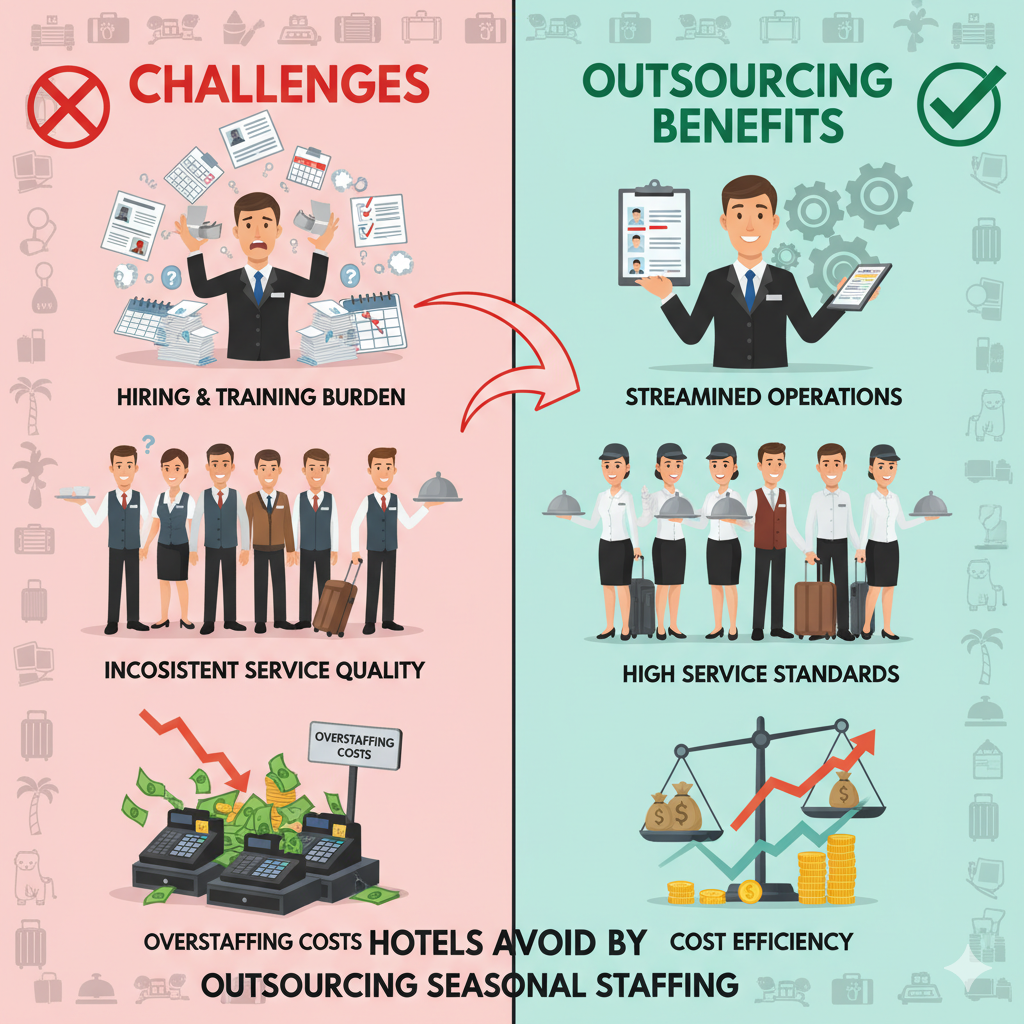
Outsourcing seasonal staffing solves many of the operational and logistical challenges that hotels face during peak tourism season. On the surface, it may seem like hotels only need “extra hands,” but the reality is far more complex. Hiring, training, scheduling, and managing large temporary teams is difficult, time-consuming, and expensive when handled in-house. This is why outsourcing hotel staffing solutions is not just a convenience—it’s a strategic decision that helps hotels avoid costly mistakes, operational disruptions, and poor guest experiences.
One of the biggest challenges outsourcing helps hotels avoid is recruitment delays. During peak season, hotels frequently need staff immediately—not days or weeks later. Recruiting through traditional job postings, interviews, and onboarding processes is slow and unpredictable. Seasonal vacancies often attract inconsistent applicants, many of whom lack the necessary experience. Outsourcing removes this problem by giving hotels access to a ready-made pool of pre-screened, trained hospitality workers who can be deployed quickly. This fast turnaround is essential when guest numbers are rising and operations must remain seamless.
Training burdens are another major issue hotels dodge through outsourcing. Temporary employees still require training in hotel standards, safety protocols, cleaning procedures, food handling, and guest communication. Training takes time and attention away from core staff already stretched thin during peak season. When hotels outsource staffing, they avoid this burden because workers arrive with industry training, certifications, and practical experience. They can step into their roles with minimal orientation, reducing pressure on full-time staff and ensuring consistent service from day one.
Scheduling problems also disappear with outsourced staffing. Coordinating shifts for a large workforce becomes much harder when seasonal demand fluctuates daily. Without backup workers, hotels risk gaps in the schedule, last-minute shortages, and excessive overtime costs. Outsourcing solves this by providing flexible staff who can fill shifts quickly, even on short notice. This keeps departments properly staffed at all times without straining internal resources.
Another challenge outsourcing eliminates is high turnover. Seasonal hires often leave early or fail to show up, forcing hotels to restart the hiring process repeatedly. Outsourced staffing partners handle replacements immediately, ensuring operations never become short-handed. This provides stability during critical revenue periods.
Finally, outsourcing helps hotels avoid legal and administrative burdens such as payroll management, tax documents, labor compliance, and employment regulations. The staffing provider handles all of these responsibilities, allowing hotels to focus solely on delivering a great guest experience.
By outsourcing seasonal staffing, hotels avoid hiring headaches, staffing shortages, training demands, and operational disruptions—making peak season far easier to manage.
How Hotel Staffing Solutions Improve Safety and Compliance
Safety and compliance are essential pillars of hotel operations, yet they become significantly more challenging to uphold during peak tourism season. Higher occupancy means more movement throughout the property, increased use of facilities, and a greater need for strict adherence to health, safety, and regulatory standards. Understaffed or overworked teams may unintentionally overlook important procedures, creating risks for both guests and employees. This is where hotel staffing solutions play a crucial role by reinforcing safety practices, ensuring compliance, and maintaining a secure, well-managed environment even when business is at its busiest.
One of the biggest challenges hotels face is ensuring all safety protocols are followed consistently. From fire safety procedures and emergency exits to sanitation standards and guest identification checks, each step requires focused attention. During peak seasons, when staff are under extreme pressure, these procedures may be rushed or accidentally neglected. Additional staff brought in through staffing solutions help distribute workload more evenly, giving employees the time and focus needed to perform tasks properly and safely.
Trained seasonal staff also come with knowledge of industry safety standards, which greatly reduces the risk of errors. Whether it’s food handling regulations in the kitchen, cleaning protocols in housekeeping, or guest privacy laws at the front desk, compliance is non-negotiable. Supplemental workers familiar with these guidelines strengthen the hotel’s ability to meet legal and regulatory requirements without placing added pressure on full-time staff. This not only protects guests but also shields the hotel from potential fines, penalties, and reputational damage.
Maintenance and facility management are additional areas where staffing solutions boost safety. Higher guest traffic leads to more frequent maintenance issues—faulty lights, broken fixtures, elevator malfunctions, and plumbing problems. These issues must be resolved quickly to prevent accidents or hazards. Seasonal maintenance staff ensure repairs are handled promptly, inspections are completed on schedule, and safety standards remain intact throughout the property.
In food and beverage departments, safety is equally critical. Seasonal kitchen and service staff trained in hygiene and sanitation help maintain strict cleanliness, prevent cross-contamination, and uphold food safety regulations. With more hands on deck, the kitchen environment remains organized and compliant even during high-volume service.
Finally, adequate staffing enhances guest safety by improving surveillance and monitoring. Public areas, pools, gyms, parking lots, and entrances require attention, especially when guest traffic is heavy. Additional attendants, security support, and public-area staff help maintain order, monitor activity, and provide assistance when needed.
In short, hotel staffing solutions ensure that safety and compliance never take a backseat—no matter how busy the hotel becomes.
Future of Seasonal Staffing in the Hospitality Industry
The hospitality industry is evolving rapidly, and the future of seasonal staffing is shaping up to be more dynamic, technology-driven, and guest-centered than ever before. As travel patterns shift and guest expectations rise, hotels must adapt quickly to stay competitive—especially during peak tourism seasons. This is where future-focused hotel staffing solutions will play an even greater role, offering smarter, faster, and more flexible ways to meet operational needs while enhancing the guest experience.
One major trend shaping the future of seasonal staffing is the increasing reliance on technology. From AI-powered scheduling tools to advanced workforce management platforms, technology will streamline how hotels match staffing levels to occupancy forecasts. Predictive analytics, for example, will use historical data, market trends, and real-time booking activity to determine exactly how many staff members each department needs on any given day. This ensures hotels always have the right number of workers—neither too many nor too few—helping optimize labor costs while maintaining exceptional service.
Another emerging trend is the growing popularity of hybrid workforce models. Instead of relying solely on full-time employees or temporary workers, hotels will adopt flexible staffing structures where permanent staff are supported by a rotating pool of seasonal, part-time, on-call, and gig-based professionals. This model gives hotels greater agility and helps accommodate fluctuations in demand without overburdening core teams. As more hospitality professionals embrace flexible work arrangements, hotels will have access to a larger, more diverse talent pool than ever before.
Skill specialization will also become increasingly important. Guests expect seamless, personalized service, which means hotels will need workers with specific expertise—whether it’s a multilingual concierge, a certified mixologist, a technology-savvy event technician, or a sustainability-focused housekeeper. Seasonal staffing solutions will adapt by offering more specialized training programs and certifying workers in high-demand hospitality skills. Hotels that capitalize on these specialized roles will stand out for their service quality and guest experience.
Sustainability is another factor influencing the future of seasonal staffing. As more hotels adopt eco-friendly operations, staffing solutions will evolve to include workers trained in green housekeeping practices, waste reduction, energy-efficient maintenance, and sustainable food preparation. Guests increasingly value hotels that prioritize environmental responsibility, and having knowledgeable staff on board reinforces that commitment.
Additionally, the future will see a stronger emphasis on employee well-being. Hotels are realizing that burnout and turnover directly impact service and profitability. Seasonal staffing will evolve to support mental health, work-life balance, and fair scheduling—all of which lead to more motivated and engaged teams.
Overall, the future of seasonal staffing will bring smarter tools, better training, greater flexibility, and a stronger focus on guest satisfaction. Hotels that embrace these advancements will be better equipped to navigate peak seasons with confidence, efficiency, and excellence.
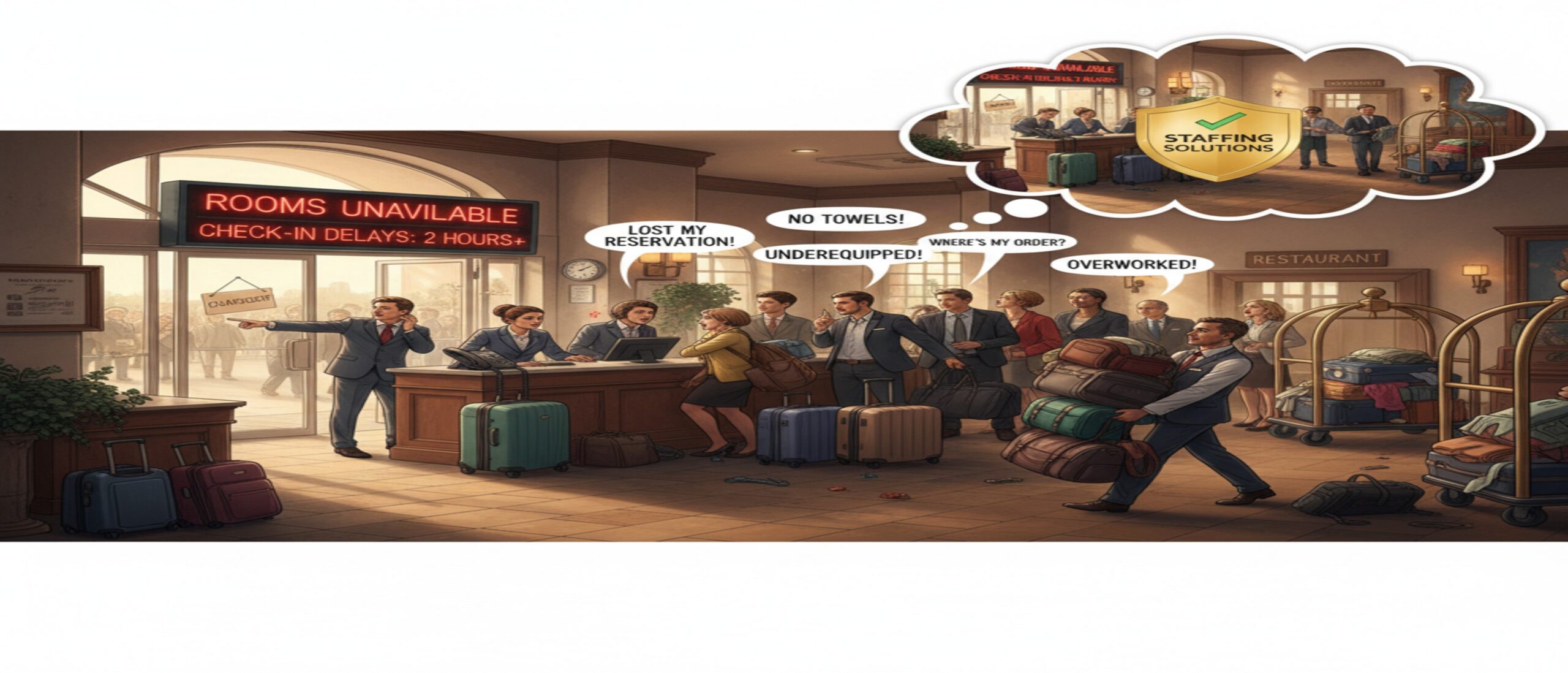

Leave a Reply